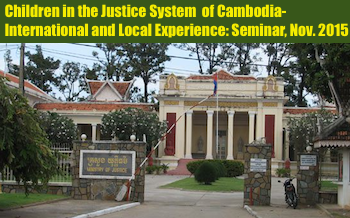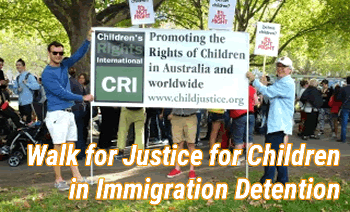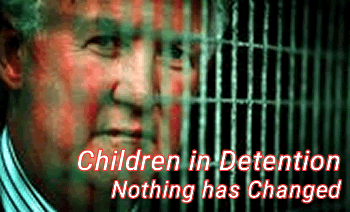 In 1995 the Hon. Alastair Nicholson, then Chief Justice of the Family Court of Australia, raised the issue that Australia was failing its international obligations by holding children in detention centres. His comments were published in an article titled 'Judge damns refugee camps', by Chip Le Grand, The Australian, Thursday 20th of July 1995 (Edition: Sydney). The full text of the 1995 article is reproduced below; it seems that in 20 years little or nothing has changed.
In 1995 the Hon. Alastair Nicholson, then Chief Justice of the Family Court of Australia, raised the issue that Australia was failing its international obligations by holding children in detention centres. His comments were published in an article titled 'Judge damns refugee camps', by Chip Le Grand, The Australian, Thursday 20th of July 1995 (Edition: Sydney). The full text of the 1995 article is reproduced below; it seems that in 20 years little or nothing has changed.
Judge damns refugee camps
AUSTRALIA was failing its international obligations by detaining child refugees in "virtual concentration camps" in the wilderness of the outback, the head of the Family Court, Justice Alastair Nicholson, said yesterday.
Justice Nicholson said it was intolerable and unnecessary to intern Chinese and Cambodian children among asylum-seekers at the remote Port Hedland detention centre in Western Australia as though they were "a danger to Australian society". He said the policy was at odds with Australia's status as a signatory to the United Nations Convention on the Rights of Children and nominated the Family Court, with its powers to protect children, as a possible avenue for legal challenges to the detention system.
"It is not something that we would tolerate for any Australian child and I don't see that we should tolerate it in relation to these children," the judge said. Justice Nicholson's denunciation of Australian policy in relation to child refugees brought a strenuous rebuttal from the federal Minister for Immigration, Senator Bolkus, who dismissed his remarks as "emotional and sensationalist nonsense". Justice Nicholson delivered his criticism of the immigration authorities at a national forum on children's rights in Melbourne. He claimed the child refugees were being treated less humanely than convicted criminals.
"I simply fail to understand why so many children and parents are, in effect, interned while issues as to the legality of their entry to this country are determined," he said.
"They are held in virtual concentration camps in the wilderness as though they were a danger to Australian society."
"There must be better ways of dealing with people who are seeking asylum in Australia rather than taking them off to some remote area in Western Australia and keeping them there." Justice Nicholson said a better and cheaper alternative would be hostels in the major cities, where refugees would have to report regularly to immigration authorities, but might be able to support themselves. He likened the strategy to the parole system for convicted criminals.
"That would give these people the opportunity to earn some money themselves (while) they are waiting on legal processes and it would be a much more normal and much more humane way for them to live," he said.
"People who are released from jail on parole quite often live in the community in a perfectly normal fashion. It does not seem to me that these people represent a greater threat to society than those people." He compared the treatment of refugees in Australia to Hong Kong, where refugees are reportedly penned in cages on outlying islands.
Of the 809 boatpeople in detention centres in Australia, 282 are under the age of 18. The Port Hedland centre houses about two-thirds of the boatpeople.
Senator Bolkus rejected the judge's claim that the child refugees were being subjected to abhorrent treatment. He said the Port Hedland facility enabled refugees to stay together as family units, where they could enjoy "appropriate comfort and dignity" with access to an "extensive range of high-level medical and educational services". Australia's handling of boatpeople was criticised by Amnesty International in its recent annual report, in which it argued asylum-seekers should have the right to "challenge their detention in the courts". Yesterday's national forum, entitled Children First: the State of Young Australians, was organised by the welfare and research group, Oz Child, to debate the rights of children in Australia. It was attended by Australian and overseas experts on child welfare, health and education.
Oz Child's president, Mr Neville Turner, said a key recommendation of the forum was that the principles of the UN convention should be enshrined in a federal Act to be given legislative teeth. Mr Turner joined the acting human rights commissioner, Mr Kevin O'Connor, in calling on the Federal Government to introduce a Charter of Rights for Australian Children, which would bind State and federal governments to the tenets of the UN convention.
Mr Trevor Carlyon, the executive director of Kid's Help Line, a national telephone counselling service, said empowering children with legal and political rights was an essential precursor to children having a greater voice on issues such as education.
The federal Opposition's spokesman on youth affairs, Senator Ian Campbell, told the forum the Coalition would address the problems facing Australian children by creating an Office of Youth Affairs.














